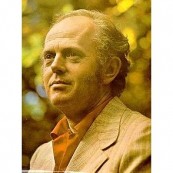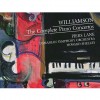Composers
Malcolm Williamson
| Country: | Australia |
| Period: | Contemporary classical music |
Malcolm Benjamin Graham Christopher Williamson, AO, CBE (21 November 1931 – 2 March 2003) was an Australian composer. He was the Master of the Queen's Music from 1975 until his death.
Williamson was born in Sydney and studied composition and horn at the Sydney Conservatorium of Music. His teachers included Eugene Goossens.[1] In 1950 he moved to London where he worked as an organist, a proofreader, and a nightclub pianist. From 1953 he studied with Elisabeth Lutyens. Williamson was a prolific composer at this time, receiving many commissions and often performed his own works, both on organ and piano.
In 1975, the death of Sir Arthur Bliss left the title of Master of the Queen's Music vacant. The selection of Williamson to fill this post was a surprise, over other composers such as Benjamin Britten, Michael Tippett and Malcolm Arnold, such that William Walton had remarked that "the wrong Malcolm" had been chosen.[2] In addition, Williamson was the first non-Briton to hold the post.[3] He wrote a number of pieces connected to his royal post, including Mass of Christ the King (1978) (see below) and Lament in Memory of Lord Mountbatten of Burma (1980). However, controversy attended his tenure, notably his failure to complete the intended "Jubilee Symphony" for the Silver Jubilee of Queen Elizabeth II in 1977.[4] He became less prolific in "Royal" works during the last twenty years or so of his life, although he never completely ceased to take interest in writing music for the Royal Family (see list of "Royal Works" below). His overall compositional output slowed considerably due to a series of illnesses. He died in 2003 in a hospital in Cambridge.
Williamson married Dolores Daniel in 1960 and had one son and two daughters.[5][6]
Williamson had a number of relationships with both sexes. After his marriage broke down in the 70’s, “a deep relationship with musician and publisher Simon Campion helped sustain him through the inevitably stormy periods, both in Australia and in England, that characterised the final stages of his career.”
Recently Added
| Country: | Australia |
| Period: | Contemporary classical music |
Biography
Malcolm Benjamin Graham Christopher Williamson, AO, CBE (21 November 1931 – 2 March 2003) was an Australian composer. He was the Master of the Queen's Music from 1975 until his death.
Williamson was born in Sydney and studied composition and horn at the Sydney Conservatorium of Music. His teachers included Eugene Goossens.[1] In 1950 he moved to London where he worked as an organist, a proofreader, and a nightclub pianist. From 1953 he studied with Elisabeth Lutyens. Williamson was a prolific composer at this time, receiving many commissions and often performed his own works, both on organ and piano.
In 1975, the death of Sir Arthur Bliss left the title of Master of the Queen's Music vacant. The selection of Williamson to fill this post was a surprise, over other composers such as Benjamin Britten, Michael Tippett and Malcolm Arnold, such that William Walton had remarked that "the wrong Malcolm" had been chosen.[2] In addition, Williamson was the first non-Briton to hold the post.[3] He wrote a number of pieces connected to his royal post, including Mass of Christ the King (1978) (see below) and Lament in Memory of Lord Mountbatten of Burma (1980). However, controversy attended his tenure, notably his failure to complete the intended "Jubilee Symphony" for the Silver Jubilee of Queen Elizabeth II in 1977.[4] He became less prolific in "Royal" works during the last twenty years or so of his life, although he never completely ceased to take interest in writing music for the Royal Family (see list of "Royal Works" below). His overall compositional output slowed considerably due to a series of illnesses. He died in 2003 in a hospital in Cambridge.
Williamson married Dolores Daniel in 1960 and had one son and two daughters.[5][6]
Williamson had a number of relationships with both sexes. After his marriage broke down in the 70’s, “a deep relationship with musician and publisher Simon Campion helped sustain him through the inevitably stormy periods, both in Australia and in England, that characterised the final stages of his career.”



